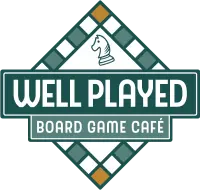How Monopoly Helped POWs Escape During WWII
Seriously, We’re Not Making This Up
Here at Well Played Board Game Café, we’ve seen Monopoly bring out the best and worst in people. But back in the 1940s, it quite literally helped save lives. That’s right—during World War II, the beloved game of capitalist conquest doubled as a covert operation tool, complete with secret maps, real money, and enough ingenuity to make Q from James Bond jealous.
The Secret Agents of… Parker Brothers?
It all started when the British secret service (MI9, to be exact) decided it needed a clever way to smuggle escape tools into German prisoner-of-war camps. Regular care packages would be inspected, so anything suspicious would be confiscated. The solution? Hide them in something so innocuous, so utterly boring to a German soldier… like a board game.
Enter: Monopoly.
The British government partnered with John Waddington Ltd., the UK-based printer licensed to produce Monopoly. But instead of just printing out properties and Chance cards, they got to work creating a souped-up, MI9-approved version of the game.
What Was Hidden Inside?
You’d never know by looking at it, but these special Monopoly boards were escape kits in disguise:
- Silk Maps: Thin, silent, and durable, silk maps were folded and hidden inside the game board itself. They were detailed escape guides showing safe routes out of Germany and occupied Europe.
- Compasses: Tiny brass compasses were concealed inside the game pieces or disguised as part of the tokens.
- Real Currency: Yep, mixed in with Monopoly money were real German, Italian, and French banknotes. Think of it as the ultimate ‘Community Chest’ payout.
- Files & Blades: Miniature tools were even baked into the game pieces, perfect for cutting through bars or locks—though not quite suitable for opening cans of whoop-ass on your cousin during family game night.
How Did They Get Away With It?
With a level of sneakiness that would make a rogue in Dungeons & Dragons weep with joy, the British sent these Monopoly sets to POWs under the guise of fake charities and humanitarian aid organizations. The Germans, eager to keep the prisoners entertained and docile, happily passed along the parcels.
The secret? A tiny red dot on the Free Parking space—a subtle signal to prisoners that the game was rigged (in a good way).
So… Did It Work?
According to various historical sources, these Monopoly sets helped hundreds—if not thousands—of prisoners plan and execute successful escapes. The tools provided real tactical advantages, especially the maps, which guided POWs through unfamiliar and dangerous terrain.
Of course, exact numbers are hard to pin down—after all, nobody was tweeting about their great escape in 1943—but MI9 officers later confirmed that the game played a vital role in several success stories.
Roll for Freedom
It’s not every day you find out your favorite board game once doubled as a spy kit. But the Monopoly mission is a shining example of British ingenuity, wartime creativity, and the surprising power of play.
So next time you’re sitting around a table at Well Played, rage-trading Baltic Avenue for the tenth time, remember: this isn’t just a board game. It’s a piece of history. And while we can’t promise a real-life escape map in your next game night set, we can offer great snacks, awesome company, and slightly fewer war crimes.
Unless you count what happens when someone buys up all the railroads.

